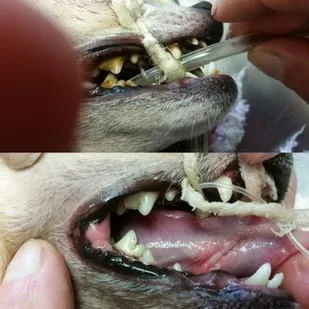Having your teeth clean by brushing daily is very important. It prevents gum infection, decaying and rotting of teeth. The same goes with your pets.
While it may sound funny the idea of brushing your pets teeth or taking them to the doctor to get them cleaned, the fact is that by the time they are 3 years of age, 85% of dogs and 70% of cats have some evidence of periodontal disease. Periodontal disease takes place when food particles are
combined with bacteria to form a plaque on your pets teeth. Over time, a hard substance that sticks to the teeth also known as tartar gets formed from the minerals in saliva and plaque bonding. The bacteria can cause gingivitis, it can also destroy tissue around the tooth, which could cause tooth loss.
Veterinary dental cleaning is the only way to take out tarter under the gum tissue and from the teeth. It is important to know that periodontal disease is not reversible, however gingivitis is. Therefore we tell our patients to perform regular veterinary cleaning and follow-up care.
Dental cleaning is the process of removing plaque and tartar from your pet’s teeth. At animal care clinic, our veterinary makes sure to carefully asses the entire mouth (gums, lips, teeth, tongue) to make sure its healthy. Our hospital takes pride in thorough dental cleaning, we accomplish that by making sure every teeth is properly cared for and is looked at. The dental procedure is done through general anesthesia, this is done to prevent your pet from feeling any pain and to allow our veterinarian to inspect each teeth and remove tartar.
Dental cleaning for your pet includes the following:
- Removal of plaque and tartar from the teeth
- Removal of plaque and tartar from under the gum
- Assessing dental sockets for any dental disease
- Smoothing enamel scratches
- Inspection of lips, tongue and entire mouth for any other problems
When does my pet need a dental cleaning?
To catch dental disease in its early life, regular visits to inspect your pets mouth is important. Signs of dental disease are as follows:
- Brownish-gold color builds up on the teeth, and near the gum line – also known as tartar
- Gum-line is red or bleeding
- Bad breath
- Drooling
- Pawing at the mouth
- Missing or loose teeth
- Hard time eating
